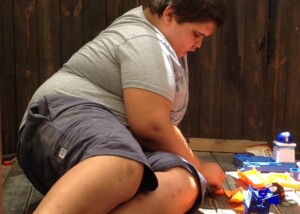
Think long and hard before sending your obese child to that luxurious “fat camp” tucked away in the majestic mountains somewhere.
The monthly fee can be in the thousands, and the stay may be up to four months.
But high price doesn’t = success.
As a former personal trainer, I will tell you that four months with a personal trainer might run the same fee, but there are major advantages to the so-called fat camp.
- The teen or younger client still lives at home, and thus, throughout the duration of the training program, will learn to adopt healthier lifestyle habits that realistically fit into their home and school life.
- There would be no isolated compound far from their parents and social circle — an unrealistic setting. Thus, anything “learned” there is not sustainable once the teen or younger child comes home.
“Weight reduction camps in children and teens are a short-term solution,” says Dr. Lisa Lewis, MD, a board certified pediatrician in Fort Worth, Texas, and author of “Feed the Baby Hummus, Pediatrician-Backed Secrets from Cultures Around the World.”
“If a child attends a weight reduction camp, the behaviors taught and healthy food habits must continue after they leave the camp.
“In our world, this is not easy to institute. A parental commitment to provide healthy foods and promote exercise on a daily basis is important in this situation.”
A weight loss camp may include a complete academic curriculum plus dormitory living quarters for their residents.
If you, as a parent of an overweight child, are tempted to sign him or her up for a weight loss camp or boarding school — you should first find out what the success rate is for keeping the weight off for one year following completion of the program.
You might be shocked that the percentage isn’t as high as you’d think for such a posh compound.
Fat Content of Foods
The program may put emphasis on this. But there’s more to an obesity-inducing diet than fat content of food.
Portion sizes are a significant factor. Portion control needs to be emphasized as well.
If all the focus is on fat grams, this ends up being non-applicable to real-life living once these kids leave the facility.
Adolescents and teens often go places where there are fattening foods and very little, if any, fat-free foods to select from.
Thus, all that concentration on fat grams at the facility means nothing when they are at a fast-food restaurant, ball games or big birthday bash with friends.
You should find out how the “fat camp” prepares their clients how to keep the weight off and continue losing once they are back in the real world.
Once the Child Is Back Home
“I don’t recommend constant reminding statements such as ‘don’t eat that.’ Adopt a healthy eating lifestyle for the whole family,” says Dr. Lewis.
“If the child or teen is not ‘singled out’ as the overweight child, they are more likely to be receptive to lifestyle changes in the home.
“Teen eating and exercise behaviors are especially difficult to change long-term unless the teen is motivated to do so.
“Teens are in a developmental phase that involves building independence, and perceived criticism can backfire easily.
“The teen must be completely on board with the dietary and exercise changes or they simply won’t comply.”
Personal Training for Teens and Adolescents
Don’t ever think for a second that your obese child is too young for a personal trainer.
The right trainer will be knowledgeable about nutrition and how eating impacts metabolism.
When I was a personal trainer at a gym, I had some teenage clients. What I taught them was how to eat healthier and be more active in the real world.
There was no transition from a fat camp on a hillside to a city dwelling.
So if you’re going to spend some money to help your child lose weight — meet with a personal trainer before sending your child off to the weight loss camp.
Make sure the trainer enjoys working with kids or teens and has experience with this population.
Having 25+ years’ experience, Dr. Lewis completed her pediatrics residency at Texas A&M University Health Science Center, Scott and White Memorial Hospital. For two years afterward she was assistant professor in the department of pediatrics at Texas A&M University Health Science Center.
 Lorra Garrick has been covering medical, fitness and cybersecurity topics for many years, having written thousands of articles for print magazines and websites, including as a ghostwriter. She’s also a former ACE-certified personal trainer.
Lorra Garrick has been covering medical, fitness and cybersecurity topics for many years, having written thousands of articles for print magazines and websites, including as a ghostwriter. She’s also a former ACE-certified personal trainer.
.










































